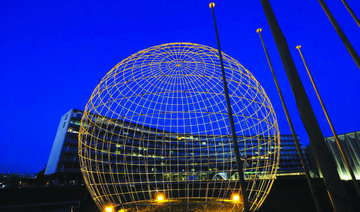RIYADH: From the northern to the eastern regions of Saudi Arabia, Riyadh’s Souq Al-Awaleen unites the diverse cultures of the Kingdom.
Visitors are greeted with warm welcomes from actors representing each region, allowing them to appreciate the variety of Saudi traditions and the distinct traditional outfits of every area.
Guests can explore the culture of coastal cities, like Jeddah, and mountainous regions such as Asir, experiencing a true melting pot of Saudi culture. They can don the flower headbands and traditional attire of the southern people, and take part in the Ardah dance from the central Najd region, brandishing Arabian swords.
The immersive experience continues as actors reenact everyday life, such as teaching in a classroom. Visitors can sit at school desks, use chalk to write on the blackboard, and take an Arabic language class that evokes nostalgic memories for many.
Additionally, guests can step into an old prison to imagine life behind bars, and browse a selection of nostalgic toys that offers a delightful trip down memory lane.
Each corner of the souq tells a unique story, offering authentic handicrafts, traditional attire and an array of spices that capture the essence of various regions.
HIGHLIGHT
Visitors can sit at school desks, use chalk to write on the blackboard, and take an Arabic language class that evokes nostalgic memories for many.
One of the standout attractions in the souq is the horror house themed around Saudi folklore, known as Al-Sa’alawa. The chilling experience is inspired by tales of a mysterious creature that has captivated the imagination of many.
The Al-Sa’alwa tent offers a thrilling horror house experience that immerses visitors in the legends of Saudi folklore. Osama Al-Balawai, an actor in the tent, describes the creature Al-Sa’alwa, which has become the subject of various interpretations.
Some view it as a ghost, others as a male figure, while some believe it takes the form of a beautiful woman. Regardless of its form, caution is advised when encountering this enigmatic being.
“Join us at the Al-Sa’alwa tent for an unforgettable experience,” Al-Balawai told Arab News. “Will you emerge safe, or will you be captivated by the legend?
“We encourage you to visit Souq Al-Awaleen to partake in this thrilling adventure. We can’t wait to see you there!”
In addition to the horror experience, Arab News discovered Bin Ghaith Textiles, a fabric shop in the market. Owner Hassan passionately shared his love for textiles, highlighting their historical significance.
“My passion is textiles and the history behind them,” he said. “I collect organic fibers and enjoy exploring what people wore before the rise of synthetic materials. This gives me a chance to connect with history.”
Hassan said that his interest lies in the organic materials used in the past, such as linen, cotton, silk and wool, contrasting sharply with today’s disposable fashion culture.
“The market is the heart of any city,” he said. “It reflects the identity of the place, offering insights into its culture and history.”
This year marks Hassan’s second time at Souq Al-Awaleen, where he appreciates the diverse crowd that arrives to explore the rich tapestry of Saudi heritage.
“The younger generation is especially curious about what their ancestors wore and how textiles have evolved,” he said. “It’s essential to preserve this knowledge and tradition.”
The market, which offers free entry, also hosts handicrafts, folk art and live performances. Local artisans have a platform to showcase their work, and visitors can take part in workshops focusing on traditional Sadu weaving and pottery.
In addition to its artisanal offerings, Souq Al-Awaleen serves up a taste of authentic Saudi cuisine at Sufrat Al-Deira. The atmosphere evokes a bygone era, enhanced by cooking demonstrations and other cultural performances.
This year’s Riyadh Season runs until March 2025 and has already drawn more than 13 million attendees, according to the Saudi Press Agency.




























